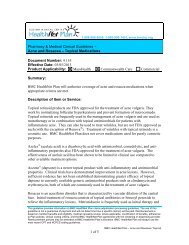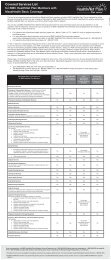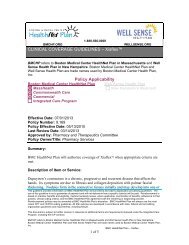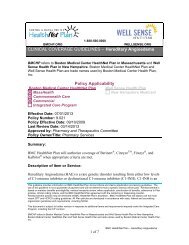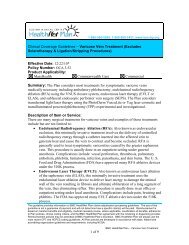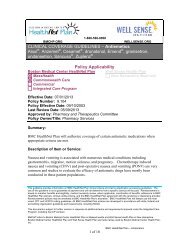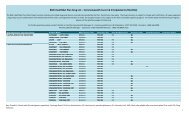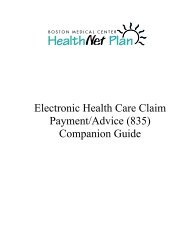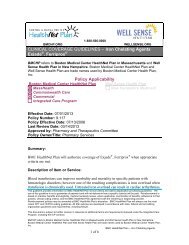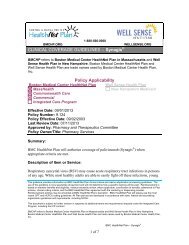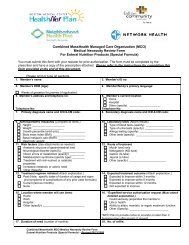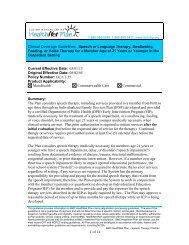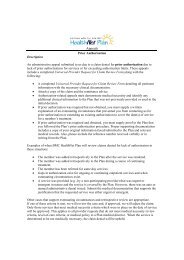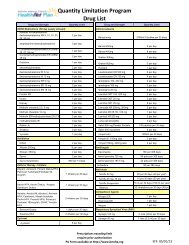IVIG - BMC HealthNet Plan
IVIG - BMC HealthNet Plan
IVIG - BMC HealthNet Plan
You also want an ePaper? Increase the reach of your titles
YUMPU automatically turns print PDFs into web optimized ePapers that Google loves.
inflammation in patients with Behcet’s syndrome who were refractory to<br />
corticosteroids and cyclosporine. 130 A controlled trial is needed.<br />
11. BK virus associated nephropathy (BKVAN) in kidney transplant patient.<br />
Limited information is available. Standard treatment is to reduce the dose of<br />
immunosuppressive therapy and therapy with cidofovir (Vistide®) or leflunomide. 131<br />
In a report from one center, 8 patients with BKVAN were treated with <strong>IVIG</strong> (and<br />
reduction of immunosuppressive therapy); 88% of patients still had functioning<br />
allografts after a mean of 15 months. 132 Prospective randomized, multi-center trials<br />
are needed to validate these results.<br />
12. Chronic fatigue syndrome. Evidence does not support <strong>IVIG</strong> use. 24<br />
13. Crohn’s disease. There is insufficient evidence to recommend <strong>IVIG</strong>. In a single<br />
center case collection report, 19 patients with acute Crohn’s disease (Crohn’s disease<br />
activity index 284.1 ± 149.8) who were resistant to steroids received <strong>IVIG</strong> daily for 7<br />
to 10 days. 133 Four weeks after completing therapy, 14 patients were in clinical<br />
remission (CDAI < 150). Spontaneous remissions cannot be excluded. Prospective,<br />
randomized, placebo-controlled trials are needed to determine if <strong>IVIG</strong> has role in the<br />
treatment of Crohn’s disease.<br />
14. Cystic fibrosis. Evidence does not support <strong>IVIG</strong> use. 24 Some of these patients may be<br />
hypogammaglobulinemic and if so will be evaluated by a pharmacist and/or a<br />
physician on a case-by-case basis to determine a coverage recommendation for the<br />
client.<br />
15. CMV disease prophylaxis in bone marrow transplant or HSCT recipients. <strong>IVIG</strong><br />
is not recommended. 39,59 <strong>IVIG</strong> has been used in the past for CMV prophylaxis, but<br />
CMV prophylaxis is currently based on using seronegative blood in seronegative<br />
recipients, screening for CMV antigenemia, and prophylaxis with ganciclovir in some<br />
patients. 27 However, it is recommended for other indications in these patients. See<br />
Other Uses with Supportive Evidence.<br />
16. CMV infection, that is, preemptive therapy for CMV infection or treatment of<br />
CMV disease, in allogeneic bone marrow transplant or HSCT patients. Not<br />
recommended. Preemptive therapy is defined as receiving therapy when there is<br />
evidence of active, but asymptomatic, CMV infection and is based on tests that<br />
rapidly detect CMV viremia or antigenemia. 39,59 Preemptive therapy is used in most<br />
cases instead of prophylaxis for CMV management. First-line preemptive therapy for<br />
CMV infection is ganciclovir or foscarnet. 59 Although most studies using <strong>IVIG</strong> for<br />
preemptive therapy were randomized, the patient populations were heterogeneous, the<br />
<strong>IVIG</strong> dose varied, most but not all used ganciclovir, and they were not adequately<br />
controlled. 58 <strong>IVIG</strong> monotherapy does not appear to be effective for preemptive<br />
therapy. Current CDC, IDSA, and the American Society of Blood and Marrow<br />
Transplantation guidelines do not include recommendations for use of <strong>IVIG</strong> in<br />
preemptive therapy of CMV infections. 39<br />
17. Diabetes mellitus. Evidence does not support <strong>IVIG</strong> use. 134-135 Antibodies against islet<br />
cell antigens are implicated in the autoimmune pathogenesis of type 1 diabetes<br />
mellitus. 23 In a 2-year randomized controlled trial, <strong>IVIG</strong> was given every 2 months to<br />
This guideline provides information on <strong>BMC</strong> <strong>HealthNet</strong> <strong>Plan</strong> claims adjudication processing guidelines. The use of this<br />
guideline is not a guarantee of payment and will not determine how a specific claim(s) will be paid. Reimbursement is<br />
based on member benefits and eligibility, medical necessity review, where applicable, coordination of benefits, adherence<br />
to <strong>Plan</strong> policies, clinical coding criteria, and the <strong>BMC</strong> <strong>HealthNet</strong> <strong>Plan</strong> agreement with the rendering or dispensing provider.<br />
Reimbursement policies may be amended at <strong>BMC</strong> <strong>HealthNet</strong> <strong>Plan</strong>’s discretion. <strong>BMC</strong> <strong>HealthNet</strong> <strong>Plan</strong> will always use the<br />
most recent CPT and HCPCS coding guidelines.<br />
<strong>BMC</strong> <strong>HealthNet</strong> <strong>Plan</strong> – <strong>IVIG</strong><br />
28 of 45



